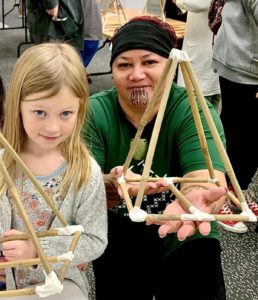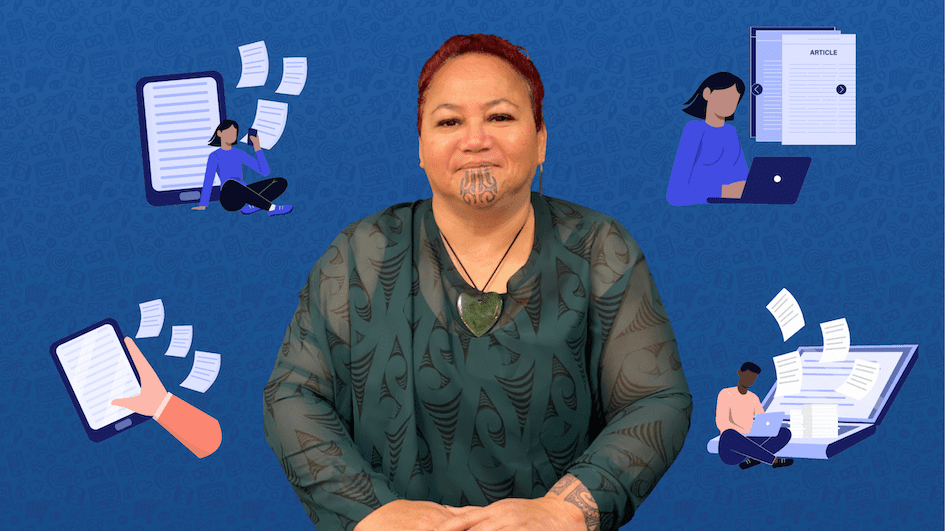Terehia is NZIE’s Cultural Support advisor. She is of Maori and Italian descent and is an active member of the Tāmaki Makaurau North Shore community. In this blog, Terehia offers 5 tips to maintain a cultural connection while studying online.
A Safe Cultural Space
Terehia reassures all staff and students of NZIE that “no matter what…you’re in a safe cultural space.” She provides NZIE staff, and tutors, with cultural training and mentorship, to ensure Maori principles are upheld in all that we do.
“Empowering, walking alongside the staff to get them to put the Te Reo Maori goggles on, and to open their eyes that there’s another world out there – they don’t have to follow the path of the Western culture. And to just build the capacity of knowledge and confidence.”
She says unity is one of the most important aspects of cultural training and guidance.
A decade at NZIE
Terehia has been working at NZIE for 10 years, and her role has always been evolving. When NZIE was an international school, Terehia was a tutor for a hospitality course. When Rob Marks, NZIE’s Managing Director, heard Terehia welcoming her class with a karakia and song, he asked if she could deliver that in all classes in the future.
“It was about just bringing [the many different international students] together for the one purpose of learning. It was one way for me to show my culture, bring it into NZIE and bring the students together.”
She found many links between Māori culture and the wide range of backgrounds of NZIE students. For example, her Brazillian students loved performing the haka.
“Everyone in the whole world knows the haka. So as soon as they know that someone’s doing the haka they come together really quickly: it doesn’t matter who you are.”
Using Māori principals to support students
Now, not only does Terehia support and mentor staff to deliver the correct cultural practices, but she also provides 1-1 support to students, as part of the Client Success Team.
The Client Success Team are guided by the Te Whare Tapa Whā model, a Māori health model developed by Mason Durie, where we approach situations by looking at ways to improve the four sections of Hauora (well-being). The four sides consist of physical health, spiritual well-being, mental & emotional and family & social.
NZIE also utilises the Tuakana-Teina relationship and mentor model. This is where graduates or students further down the course can partner with newer students for additional support.
Pictured below is a diagram of Te Whare Tapa Whā:

“New whānau”
Terehia says once students start NZIE, we become their “new whānau”. There are many ways to support a student using this model. It could be sending them a gift or pamper pack, providing them with a device, planning financial support plus many other ways.
“It’s not just a student. And it’s not just about the work. It’s about the whānau life, their financial life, the spiritual side, the physical side, and the mental side.”
NZIE has a high level of pastoral care, and students are well known by staff from all departments on a personal and individual level. “Everyone knows the students’ names. It’s not just student number 45, something like that. So we all bring different skills to it. And I think that’s what makes a difference.”
Supporting Māori and Pasifika students
The strongest way Terehia can connect with Māori and Pasifika students is through whānau, and understanding their community.
She had an interaction with an NZIE student who was pregnant. During a 1-1 with the students, Terehia noticed the student’s mum “crawling along the ground, trying not to interrupt”. She asked to speak to the mother and was glad to meet her.
“I told her: You’re a part of this. You’re a part of the support group that’s going to keep your daughter learning and achieving while she has the baby. Those little things are crucial [to supporting students].”
Key tips for cultural connection online
Terehia suggests these tactics to connect students in an online environment, especially as many of our students live all over Aotearoa.
Use a unique background:
She says using personal touches like a unique Zoom background can spark conversation and bring in an element of personality to online sessions.
Celebrate success:
Terehia encourages all students to celebrate their success: it could be finishing a difficult paper, handing in an assignment on time or achieving a high grade. She recommends students travel to Tāmaki Makaurau to attend graduation, as it is a huge achievement to celebrate.
Pronounce names correctly:
Learning the correct pronunciation of names is important: it’s always okay to ask and double-check.
Try your best:
Giving your best effort when singing a traditional song can make a huge difference: “We are not here to get on New Zealand idol. Just sing… Because it’s the words I want you to learn and connect with.”
Understand cultural needs:
And finally, being aware that each student has their cultural responsibilities, that we should honour and respect. That way, we can navigate success for each student, however, that looks for them.



